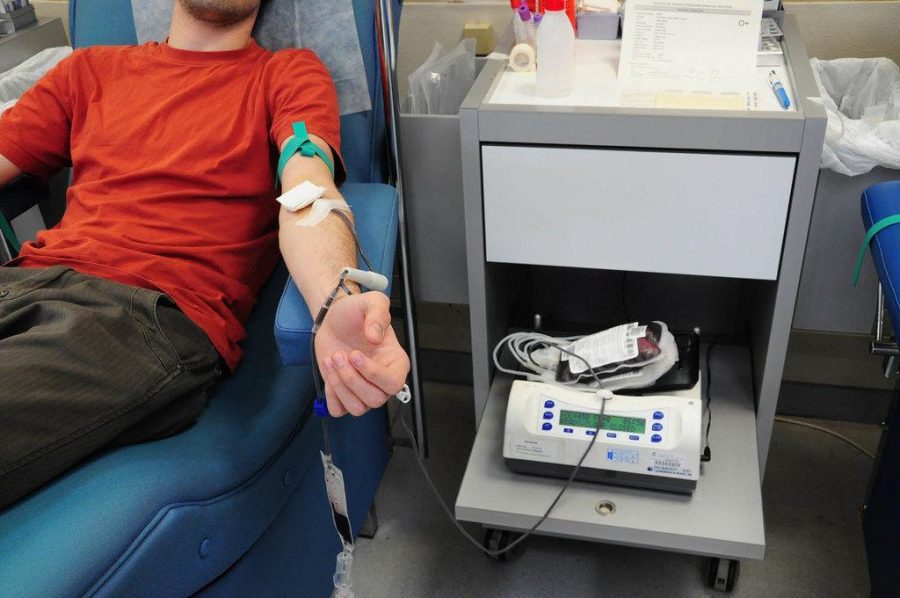Don’t let COVID-19 ‘dissuade you from donating,’ the need for blood donations continues
May 16, 2020
In the initial few weeks following the global outbreak of COVID-19, countless Red Cross blood drives were forced to cancel, even when people all across the United States still needed a constant supply of blood donations.
In the beginning, when the U.S. seemed unaware of the direction that the pandemic would go in, large gatherings like blood drives seemed too risky, even though their services were essential.
The initial shut-down resulted “in hundreds of thousands of fewer blood donations,” said Christine Welch, the communications manager at the American Red Cross Oregon-Washington Blood Services Region, in an email.
“In times of crisis, the Red Cross is fortunate to witness the best of humanity as people rolled up a sleeve to help those in need. Thanks to the many who gave blood and scheduled upcoming appointments in Oregon in the past two months, the Red Cross has been able to meet immediate patient needs,” Welch said.
However, there is still uncertainty in how long this pandemic will continue for, and Welch said the Red Cross still needs the help of blood donors and blood drive hosts to maintain a sufficient blood supply for weeks to come.
Rachel Patterson, a second-year medical student at Oregon Health & Science University, said she donated blood on March 23 at the American Red Cross Blood Donation Center in Portland, Ore.
“I thought the American Red Cross did a great job of making sure to maintain social distance between donors, particularly while we were waiting to be called back. They also checked our temperature before we even could officially sign-in and then again right before we actually donated the blood. Things were constantly being cleaned including the doorknobs and chairs,” Patterson said in an email.
Patterson said that since her donation was closer to the start of quarantine, masks were not mandatory yet, and only a few donors had chosen to wear them. She said that she has scheduled another blood donation for the end of June, with masks required for all staff members and donors.
“My father has been regularly donating for about two years now and I was inspired by him to help play a small role in someone else’s story. A few weeks after I donated, the American Red Cross sent me an email that my blood was on the way to help a patient in Virginia. It was really great to see where my blood was sent to help a patient in need; it felt amazing to get the follow up,” Patterson said.
Patterson said she thinks that donating during quarantine is great if you are sure that the blood donation site is following appropriate social distancing guidelines and cleaning habits, and recommends wearing a mask to protect yourself, staff members and other donors during the donation.
“I don’t think you should shy away from donating, unless you are at higher risk for getting COVID-19 then it is not worth risking your health. But if you are able to donate and have a local site that is practicing [Centers for Disease Control and Prevention] guidelines, I wouldn’t let quarantine dissuade you from donating; blood donation is something that hospitals and patients always need,” Patterson said.
Julie Quaid, who works for a federal contractor that monitors headstart programs across the country, plans to donate blood later this week. She said she has been donating blood regularly since 2017 and uses the Red Cross app to track her appointments and how much blood she has given. She said that initially, the volunteers ask a lot of questions to make sure your blood is healthy and safe for donation purposes.
Quaid said she has donated blood either through power red donation, where they take out a certain part of the blood and return the rest to you, or through whole blood donation.
“You just have to be careful about which one you’re doing and make sure you drink a lot of fluids and prepare yourself for that, and then for the afternoon when you get done with giving blood, then you have to be prepared to feel a little bit tired,” Quaid said.
Quaid donates blood because she realizes she is a healthy person whose blood is safe and doesn’t carry disease, making her a perfect candidate for blood donation, she said.
“I have something other people need and they need it badly, so I realize that what I have is really valuable to some people. And after I’m done with it, I’m just like ‘ooh, I can check that off my list of things I’ve done for the world today,’” Quaid said.
Quaid said she continues to give blood because she knows the Red Cross staff members are experts in what they do and because they are concerned about her health and the health of others as well. She said there’s probably going to be a greater need for blood donation, as a lot of people might not be giving any blood because of COVID-19.
“So I just figure for all those reasons, I need to go do my part and give blood because I’m still healthy and I’m following all the quarantine guidance, so I know that I have taken steps to make sure that my blood is still good for somebody. I think that makes me feel good about giving something like that to somebody, I don’t know who it is, but they’ve benefited from it,” Quaid said.
In regards to Red Cross operations, Welch commented on the significance of having constant blood donations for people who really need it.
“It’s important to remember that blood is perishable and cannot be stockpiled,” Welch said. “The need for blood for trauma patients, children battling cancer, mothers experiencing childbirth complications, patients with sickle cell disease and others continues. Donated blood has a limited shelf life of 42 days for red cells, so the supply must constantly be replenished,” Welch said.
In these unprecedented times, Welch said the Red Cross encourages individuals to keep scheduled blood donation appointments and to make new blood donation appointments for the weeks ahead to ensure a stable supply throughout this pandemic.
“In addition, the Red Cross is supporting the collection and distribution of convalescent plasma at designated Red Cross Blood Donation Centers, a potentially life-saving treatment for critically ill COVID-19 patients. People who have fully recovered from COVID-19 have antibodies in their plasma that can attack the virus,” Welch said.
More information on COVID-19 Convalescent Plasma Program can be found on the Red Cross website.

























































































































